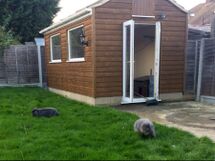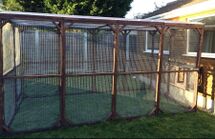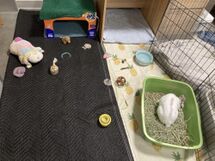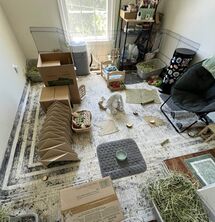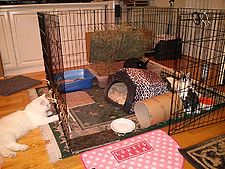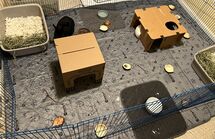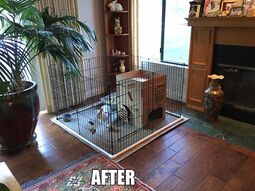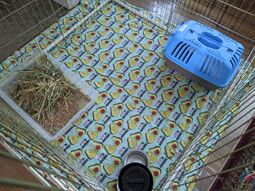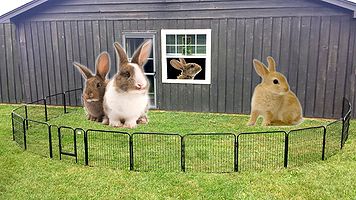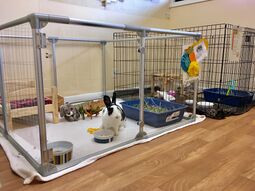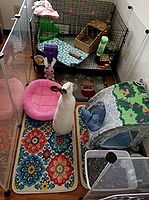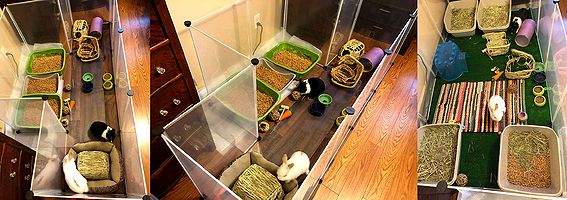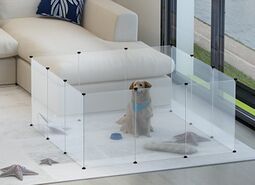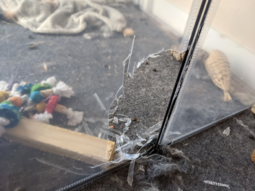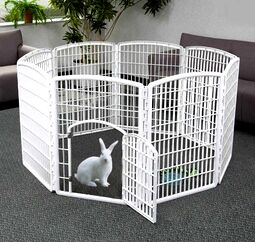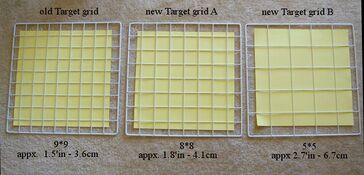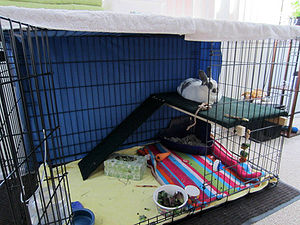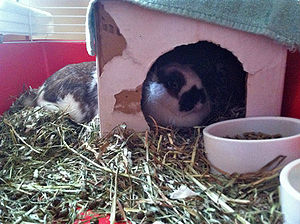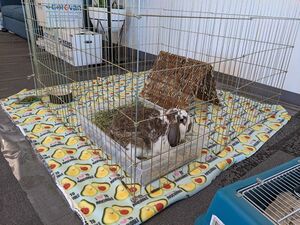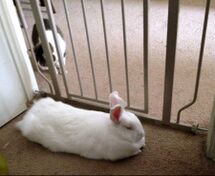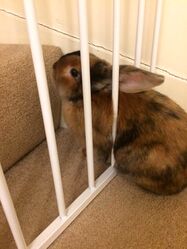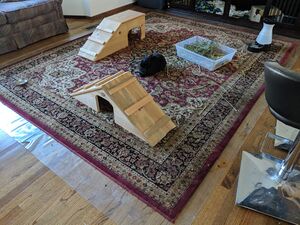Housing: Difference between revisions
SneakyDragon (talk | contribs) |
SneakyDragon (talk | contribs) |
||
| (67 intermediate revisions by 3 users not shown) | |||
| Line 7: | Line 7: | ||
{{youtube|id=a_ZdzeLVEBU|caption=Why It's Dangerous to Keep Rabbits Outside}} | {{youtube|id=a_ZdzeLVEBU|caption=Why It's Dangerous to Keep Rabbits Outside}} | ||
</div> | </div> | ||
Many people have the misconception that rabbits are smelly and belong outdoors. However, this is definitely not the case, and in fact, we recommend that you keep and '''house your bunny indoors as much as possible'''. If you get a rabbit as a pet, you should treat it as a member of the family. Family should not be relegated to live alone all the time in an isolated shed or hutch outside. | <div class="note">The overwhelming consensus is that pet rabbits live safer, happier lives indoors. Keeping rabbits outside as their primary housing is widely considered outdated and irresponsible.</div> | ||
Many people have the misconception that rabbits are smelly and belong outdoors. However, this is definitely not the case, and in fact, we recommend that you keep and '''house your bunny indoors as much as possible'''. An important philosophy you will see throughout this page is to '''remember that surviving is not thriving!''' If you get a rabbit as a pet, you should treat it as a member of the family. Family should not be relegated to live alone all the time in an isolated shed or hutch outside. | |||
There are also other reasons to keep your bunny indoors.<ref>San Diego House Rabbit Society, [http://old.sandiegorabbits.org/adoption/indoors.html Why to Keep Your Rabbit Indoors]</ref><ref>Bunniez, [http://bunniez.hubpages.com/hub/The-Great-Indoor-Rabbit-Debate- The Great Indoor Rabbit Debate]</ref> | There are also other reasons to keep your bunny indoors.<ref>San Diego House Rabbit Society, [http://old.sandiegorabbits.org/adoption/indoors.html Why to Keep Your Rabbit Indoors]</ref><ref>Bunniez, [http://bunniez.hubpages.com/hub/The-Great-Indoor-Rabbit-Debate- The Great Indoor Rabbit Debate]</ref> | ||
* Rabbits are safer indoors out of reach of '''predators'''. Rabbits can literally be frightened to death without any contact to a predator. Additionally, you will need to take many precautions that no snakes can get into your hutch. They are a real risk in certain areas. | * Rabbits are safer indoors out of reach of '''predators'''. Rabbits can literally be frightened to death without any contact to a predator. Additionally, you will need to take many precautions that no snakes can get into your hutch. They are a real risk in certain areas. | ||
* Rabbits are '''social''' animals, and in the wild, they live in enormous warrens. They enjoy the companionship from people and other | * Rabbits are '''social''' animals, and in the wild, they live in enormous warrens. They enjoy the companionship from people and other rabbits. Hutch rabbits are often never interacted with or socialized, and this lack can often result in a dull and uninterested bunny. | ||
* Indoor rabbits will probably '''live longer''' out of stressful influences such as predators and poor weather conditions. They can easily [[Hot|overheat]] or freeze to death. Poor weather conditions such as rain may also make you not want to go out to feed and check on the bunny. Rabbits are delicate, and any [[Veterinary emergencies|medical warning signs]] should be treated immediately or they will go downhill fast. Not being able to keep an eye on them can be disastrous to a bunny's health. | * Indoor rabbits will probably '''live longer''' out of stressful influences such as predators and poor weather conditions. They can easily [[Hot|overheat]] or freeze to death. Poor weather conditions such as rain may also make you not want to go out to feed and check on the bunny. Rabbits are delicate, and any [[Veterinary emergencies|medical warning signs]] should be treated immediately or they will go downhill fast. Not being able to keep an eye on them can be disastrous to a bunny's health. | ||
* Rabbits need '''[[exercise]]'''. Unless you build an extremely big hutch with a run outside or let him run around outside occasionally, the bunny will be unable to stretch his legs. You may have seen videos of wild rabbits -- see how they love to run around? You can provide a safe environment indoors out of a predator's reach for them to do what they love. | * Rabbits need '''[[exercise]]'''. Unless you build an extremely big hutch with a run outside or let him run around outside occasionally, the bunny will be unable to stretch his legs. You may have seen videos of wild rabbits -- see how they love to run around? You can provide a safe environment indoors out of a predator's reach for them to do what they love. | ||
| Line 27: | Line 28: | ||
* Dana M. Krempels, Ph.D., [http://www.bio.miami.edu/hare/indoorbun.html Why an Indoor Bunny?] | * Dana M. Krempels, Ph.D., [http://www.bio.miami.edu/hare/indoorbun.html Why an Indoor Bunny?] | ||
* House Rabbit Network, Alan L. Moyer, [http://www.rabbitnetwork.org/articles/fly.shtml Why We Won't Keep Rabbits Outdoors -- A personal story] | * House Rabbit Network, Alan L. Moyer, [http://www.rabbitnetwork.org/articles/fly.shtml Why We Won't Keep Rabbits Outdoors -- A personal story] | ||
=== Indoor housing === | === Indoor housing === | ||
| Line 48: | Line 46: | ||
{{right-image|file=RabbitInHutchHole2.jpg|caption=The side of a un-reinforced outdoor hutch that was chewed through by a bored rabbit that escaped. Source: [https://www.facebook.com/groups/840792622728438/permalink/991910214283344/ C.A.Wiltshire]}} | {{right-image|file=RabbitInHutchHole2.jpg|caption=The side of a un-reinforced outdoor hutch that was chewed through by a bored rabbit that escaped. Source: [https://www.facebook.com/groups/840792622728438/permalink/991910214283344/ C.A.Wiltshire]}} | ||
While we do not recommend outdoor housing for the reasons stated above, the following are some resources to help develop | While '''we do not recommend outdoor housing''' for the reasons stated above, the following are some resources to help develop an appropriate outdoor rabbit enclosure. Remember the rabbits can easily suffer from [[heatstroke|heat exhaustion]] at [[hot|temperatures over 85°F]], and that indoor rabbits have a history of living 4 times longer than outdoor hutch rabbits due to various factors!<ref>Dana Krempels. (n.d.). Why an Indoor Bunny?. Retrieved 10 Jul 2019 from http://www.bio.miami.edu/hare/indoorbun.html</ref> | ||
If keeping your rabbit outside is the only option in your situation, please follow some | If keeping your rabbit outside is the only option in your situation, please follow some basic guidelines for housing: | ||
* Make sure your rabbit is always protected from '''insects''' through the use of some fine mesh that you can staple to the cage. This is important to protect your rabbit from aggressive insect-borne diseases such as [[myxomatosis]]. Keep your outdoor rabbits updated on their [[vaccinations]] if they are available in your country, and you may also want to treat them regularly for [[fleas]], [[mites]], and other parasites preventatively. | * Make sure your rabbit is always protected from '''insects''' through the use of some fine mesh that you can staple to the cage. This is important to protect your rabbit from aggressive insect-borne diseases such as [[myxomatosis]]. Keep your outdoor rabbits updated on their [[vaccinations]] if they are available in your country, and you may also want to treat them regularly for [[fleas]], [[mites]], and other parasites preventatively. | ||
* Do not keep rabbits outdoors alone all the time; they need '''company''' on those dark nights! A [[Bonding|bonded]] pair or group is best outdoors. If you must house a single rabbit outside, please spend a couple of hours each day to interact with your rabbit so they will not be depressed. Rabbits are social creatures and will not do well alone with no interaction. | * Do not keep rabbits outdoors alone all the time; they need '''company''' on those dark nights! A [[Bonding|bonded]] pair or group is best outdoors. If you must house a single rabbit outside, please spend a couple of hours each day to interact with your rabbit so they will not be depressed. The more time you can spend with your single rabbit, the better. Rabbits are social creatures and will not do well alone with no interaction. | ||
* Remember, your baby bunny is likely to '''grow''' significantly! If your rabbit is young, make sure you consider their adult size when purchasing an enclosure. This housing should be tall enough for your bunny to sit up on their hind legs in the adorable act of periscoping, and it should be long enough for your bunny to completely lie down in with their feet stretched out. Consider having a multi-level enclosure so bunny can survey their surroundings as well as a permanently attached run. | * Remember, your baby bunny is likely to '''grow''' significantly! If your rabbit is young, make sure you consider their adult size when purchasing an enclosure. This housing should be tall enough for your bunny to sit up on their hind legs in the adorable act of periscoping, and it should be long enough for your bunny to completely lie down in with their feet stretched out. Consider having a multi-level enclosure so bunny can survey their surroundings as well as a permanently attached run. | ||
* Just because your rabbit is outdoors, it '''does not mean''' they have to be kept in a hutch! Consider large dog kennels with runs, sheds, aviaries, and children's wooden playhouses with runs attached. One small advantage of outdoor housing is that human furniture will not get in the way of the rabbit, and you can often offer larger square footage just for the bunnies. | * Just because your rabbit is outdoors, it '''does not mean''' they have to be kept in a hutch! Consider large dog kennels with runs, sheds, aviaries, and children's wooden playhouses with runs attached. One small advantage of outdoor housing is that human furniture will not get in the way of the rabbit, and you can often offer larger square footage just for the bunnies. | ||
| Line 58: | Line 56: | ||
* In warm weather, be very careful about '''[[flystrike]]'''! Check your rabbit's bottom every day to make sure that all poop has been cleaned off properly. | * In warm weather, be very careful about '''[[flystrike]]'''! Check your rabbit's bottom every day to make sure that all poop has been cleaned off properly. | ||
Consider planning for a temporary indoor enclosure occasionally so that the rabbit does not need to be outside on extremely [[cold weather concerns|cold winter nights]] or [[hot|hot summer afternoons]]. | |||
The following are some additional tips and instructions on having an outdoor rabbit hutch: | The following are some additional tips and instructions on having an outdoor rabbit hutch: | ||
* Save a Fluff. [http://www.saveafluff.co.uk/rabbit-info/hutches-and-runs Hutches. runs and alternative rabbit housing] | * Save a Fluff. [http://www.saveafluff.co.uk/rabbit-info/hutches-and-runs Hutches. runs and alternative rabbit housing] | ||
* The Rabbit House. [http://www.therabbithouse.com/outdoor/index.asp Outdoor Rabbit Housing] | * The Rabbit House. [http://www.therabbithouse.com/outdoor/index.asp Outdoor Rabbit Housing] | ||
* Rabbit Welfare Association & Fund.[https://rabbitwelfare.co.uk | * Rabbit Welfare Association & Fund. [https://rabbitwelfare.co.uk/outdoor-housing/ Outdoor housing] | ||
* Rabbits United. (2012). [http://forums.rabbitrehome.org.uk/showthread.php?311878-Outdoor-Housing Outdoor Housing] | * Rabbits United. (2012). [http://forums.rabbitrehome.org.uk/showthread.php?311878-Outdoor-Housing Outdoor Housing] | ||
* House Rabbit Society. (2011). [http://rabbit.org/faq-rabbits-outdoors/ Rabbits Outdoors] | * House Rabbit Society. (2011). [http://rabbit.org/faq-rabbits-outdoors/ Rabbits Outdoors] | ||
| Line 71: | Line 68: | ||
* BOING. [http://boingonline.com/outdoor_housing.html Outside Housing] | * BOING. [http://boingonline.com/outdoor_housing.html Outside Housing] | ||
== Indoor | ==Indoor pens and housing== | ||
A variety of options exist for housing rabbits in either a | A variety of options exist for housing rabbits in either a pen or other form of housing indoors. | ||
=== Size guidelines === | === Size guidelines === | ||
Although pet stores market cages specifically for rabbits, | {{right-image|file=Hyla-simplesetup.jpg|caption=A simpler bunny housing setup; meets minimum housing standards. Photo by Discord user Hyla.}} | ||
{{right-image|file=LMN-largersetup.jpg|caption=A larger bunny housing setup; meets minimum housing standards for a full-time enclosure.}} | |||
Although pet stores market cages and hutches specifically for rabbits, these '''are usually far too small to comfortably house rabbits''' and should be avoided entirely unless you plan to leave the cage or hutch open at all times, allowing the rabbit access to a larger exercise pen or free roam area. | |||
<div class="note"> | <div class="note">For 1-2 small to medium rabbits, the minimum "home base" size is 24 square feet (2.2 square meters) with 0-4 hours of daily free-roam, or 16 square feet (1.5 square meters) combined with 4+ hours of daily free-roam. These are absolute minimums more space is always better. More space is required for 3+ rabbits or large rabbits, and some shelters may have higher standards for prospective adopters.</div> | ||
From the Educated Rabbit’s article, [https://www.theeducatedrabbit.com/rabbit-cages.html "Rabbit Cages and Other Terrible Ideas"]: | |||
<blockquote>The minimum enclosure for 1-2 rabbits (about 5-6 lbs) is a 4x4[ft] exercise pen. This is big enough for a litter box, toys and food dishes. The rabbits are able to stand up, stretch out and hop around. <b>Note:</b> If you have one of the giant breeds, I would suggest you give them free range, a room of their own or, at the very minimum, a 10x6[ft] exercise pen (or bigger). The more room you give a rabbit, the happier they will be. | |||
<p><i><b>Important!</b> Despite an exercise pen, rabbits still need to have exercise outside of their pen, as well. They need approximately 4-5 hours of play time a day, so that may be the whole room instead of just a part of it or perhaps a room and a hallway, etc. Whatever you decide the play area should be, you will need to bunny-proof your home to protect both your belongings and the rabbit.</p></i></blockquote> | |||
< | The [https://www.ohiohouserabbitrescue.org/i-want-to-learn/bunny-living-space/ Ohio House Rabbit Rescue] provides the following guidelines: | ||
<blockquote>Our housing requirements are a minimum 4 ft x 4 ft of indoor space in a location where the bunny is part of the family, can receive regular attention, and continue to be socialized. The bunny should also get out of the 4 ft x 4 ft space for regular exercise. <b>We do not permit small cages, outdoor hutches, or wire bottom cages.</b> Many of our adopted bunnies live in free roam homes, or have an entire room for themselves. This is great for the bunnies! However, we do advise “[[Bunny-proofing]]” your home or room by protecting exposed wires and cords with products such as Critter Cord or Split Wire Loom Tubing. This will keep your bunny and electronics safe!</blockquote> | |||
{{right-image|file=D&T-VeterinaryCentreSizeNeeded.jpg|caption=Space display by D&T Veterinary Centre supporting RWAF's #AHutchIsNotEnough campaign.}} | |||
{{ | [https://www.facebook.com/photo/?fbid=507046234801878&set=a.336655768507593 The Rabbit Welfare Association and Fund (UK)] posted the following: | ||
<blockquote>Check out this AMAZING space display by D&T Veterinary Centre in support of our #AHutchIsNotEnough campaign to demonstrate how much space rabbits actually need. | |||
* A lot of rabbit owners are sadly unaware that rabbits need a lot more space than a commercially sold rabbit hutch has to offer. | * A lot of rabbit owners are sadly unaware that rabbits need a lot more space than a commercially sold rabbit hutch has to offer. | ||
| Line 123: | Line 96: | ||
* A hutch can be used as an indoor shelter but never as their sole housing! Ideally, outdoor rabbits should have constant access to safe and secure outdoor space. | * A hutch can be used as an indoor shelter but never as their sole housing! Ideally, outdoor rabbits should have constant access to safe and secure outdoor space. | ||
</blockquote> | |||
Please note that rabbits of larger size (such as giant breeds) will need more than the standard 16 square foot (4'x4') minimum home-base enclosure. Regardless of size or number of rabbits, <b>the more area of living space you can provide, the better</b>. | |||
If you have a young rabbit, be prepared to provide large enough housing as they grow. Small baby rabbits at 8 weeks old can [[Baby_rabbits_(domestic)#How_fast_do_baby_rabbits_grow?|rapidly grow]] to 10+ lb over the course of a few months if they are actually a giant [[breed]] of rabbit. | |||
If you do not have enough floor space to give your rabbits much more than the recommended minimum area, you can also build vertically with multiple story gridded NIC condo pens. However, please keep in mind that the rabbit should still be able to comfortably run in a straight line before you start building taller. <div class="note"> It is important to note that minimum housing requirements should be met from the area of ground floor alone if adapting a multi-tiered housing approach. '''Minimum housing requirements cannot be met by adding the areas of several flooring levels together.'''</div> | |||
Exercise with the room to run freely is paramount to a rabbit's physical and mental health. Rabbits are recommended to have a minimum of 4 hours of [[exercise]] daily. Rabbits will become [[obesity|obese]] and may develop muscular, cardiovascular, and skeletal issues from a prolonged sedentary lifestyle. Possible medical issues include [[sore hocks]] (ulcerative pododermatitis), [[osteoporosis]], [[sludge|urine sludging]], and [[Broken bones|spinal fractures]]. | |||
=== Exercise pens === | |||
[[File:X-pen.jpg|thumb|Black 30" Midwest x-pen with two ~5# rabbits|225px]] | |||
{{right-image|file=LMN-vacationpen.jpg|caption=Linus, Maliketh, and Nibbly hanging out in their x-pen setup at their pet-sitter’s house.}} | |||
[[File:XXLRabbitRun.jpg|thumb|Dangerous Run Equipment... 5” XXL Metal Rabbit Run distributed by Bunny Business Ltd. [https://web.archive.org/web/20161231192850/http://fbrc.org.uk/index.php?option=com_content&view=article&id=238%3Adangerous-run-equipment&catid=30&Itemid=157 More information.]|225px]] | |||
<b>Exercise pens</b> or <b>x-pens</b>, made of metal and usually marketed for puppies and available in pet stores, are the current modern recommendation for basic housing for a rabbit. Plastic play yard for human toddlers may also be appropriate if the rabbits are not plastic chewers. {{bad|Do not use fabric playpens as rabbits can easily chew through them and escape in a matter of minutes.}} | |||
Advantages over a traditional cage, hutch, or dog crate include the following: | |||
* Extremely portable (great if you [[travel]] with your rabbit) | |||
* Easy to reconfigure and move around the house | |||
* Can also be used outside (always with supervision) | |||
* Lots of room for litter boxes, hidey houses, [[toys]], etc. | |||
* exercise pen walls are easy mounting locations for bottles, hay racks, toys, etc. | |||
* Lots of space for your money | |||
* Unlike cages, hutches, and dog crates, exercise pens that meet appropriate housing standards can easily be found. | |||
Exercise pens are much more portable than a traditional cage, hutch, or dog crate and do not require as much up-front work as an NIC cube condo. The downsides are that you need to provide hiding houses in addition to the exercise pen itself, and this can take away from the portability somewhat. It should be stressed that the combination of an animal carrier and an exercise pen to set up at your new location is probably the easiest way to [[travel]] with your rabbit. Because the exercise pen folds, it can easily fit in the trunk or back seat of a small car. | |||
Another handy use of an exercise pen is to keep a free-roaming, fully trained bunny from getting into certain areas. Perhaps your bunny only has unsupervised access to the kitchen or the laundry room. You can use an exercise pen to block off access out of these rooms. You can also use an exercise pen to keep your rabbit away from your bed, the TV stand, or similar cord jungle. | |||
The following | <div class="box"> | ||
The following are some tips about how to use your exercise pen: | |||
* | * Set up your pen against a wall to maximize the space you get. | ||
* | * Use an exercise pen to confine a free-roaming rabbit when you're out of the house, cleaning, or the door is open. | ||
* Attach accessories like water bottles, hayracks, etc. directly to the exercise pen. | |||
* You can use wood or PVC to create a frame for the exercise pen to prevent your rabbit from pushing the edges out. Additionally, if you use a PVC frame and use blankets for flooring, you can also use {{amazon|id=product/B07GTZ9LP8|name=snap clamps}} to clamp down fleece blankets and bedsheets to the frame to prevent rabbits from tugging up the flooring. <div class="inline-image-block">{{post-image|file=HRS_chicago_xpen_pvc_frame.jpg|caption=An example of an exercise pen setup with a PVC frame to keep it square.}}{{post-image|file=Sneakydragon pvc frame.jpg|caption=A sample temporary boarding exercise pen setup with a PVC frame to keep it square.}}</div> | |||
</div> | </div> | ||
If you | Exercise pens can be generally be bought for anywhere from $30-$150. You may find them second-hand on classified ads like Craiglist and Kijiji for even cheaper. Note, be sure to sanitize any second-hand or reused pens. Exercise pens generally outcompete cages in terms of square footage per dollar. | ||
If your bunny is not a jumper, 24" tall exercise pens can be sufficient. Otherwise, 36" or higher is recommended for most rabbits unless you know they are lazy and not escape-prone. | |||
<div class="box"> | |||
Some rabbits also learn to climb the panels and will need a cover to prevent them from escaping. [https://www.facebook.com/TheRabbitHaven/videos/vb.496427947051707/1370724062955420/?type=2&theater Example video on Facebook.] {{right-image|file=SDHRS-xpen-lid.jpg|caption=A wire exercise-pen with a fitted metal wire lid to prevent escape. Source: [https://sandiegorabbits.org/education/x-pen-living San Diego House Rabbit Society]}} | |||
A few cover options: | |||
* {{amazon|id=B0002H3QX4|name=Midwest 4x4 wire top}} | |||
* Using a fitted full-size sheet and clip to sides with binder clips. | |||
See the FAQ question [[Housing_FAQ#How_do_I_stop_my_rabbit_from_jumping_out_of_their_enclosure?|"How do I stop my rabbit from jumping out of their enclosure?"]] for more tips on foiling mischievous escape-prone rabbits. | |||
The wire tops are especially helpful if you have other pets like dogs and cats in the household and need to prevent them from climbing or jumping the fence to reach your rabbit. | |||
</div> | </div> | ||
<div class="blue"> | |||
Some popular simple wire pens are the following: | |||
* {{amazon|id=B00063KG0U|name=24"-48" Midwest exercise pen, gold, with door}} | |||
* {{amazon|id=B005U6UQ62|name=24"-48" Petmate exercise pen, black, with door}} | |||
* {{amazon|id=B07584TRXX|name=24"-48" AmazonBasics exercise pen, black, with door}} | |||
* | * {{amazon|id=B014EYSFJK|name=24"-48" BestPet exercise pen, black, no door}} | ||
* | |||
* | |||
</div> | </div> | ||
<div class="bad"> | <div class="bad"> | ||
'''Warning:''' Tiny baby bunnies '''should not be placed''' in a regular exercise pen without additional barriers as they can easily squeeze out between the bars. You will either need to cut out 12-18" strips of cardboard and attach them to the bottom half of the pen to cover and make it solid until the babies grow bigger or find an exercise pen with only 1"-spaced bars such as the following: | |||
* {{amazon|id=B0002ARQT6|name=Marshall Small Animal Playpen}} | |||
* {{amazon|id=B0013TT2SS|name=Marshall Pet Products Pet Deluxe Play Pen, Small}} | |||
* {{amazon|id=B000MD3OJO|name=Kaytee Pet-N-Playpen for Rabbit, Guinea Pig and Ferret}} | |||
<div class="inline-video-block"> | |||
{{youtube|id=gJdT9HEAg60|name=CamberAdventures. (2014). Rabbit 1 Fence 0}} | |||
{{youtube|id=gcy41CbEQ50|name=u/letthemeatcakex. (2015). Well, that's not gonna work...}} | |||
{{youtube|id=n0K4hWkn66M|name=u/Bjjkwood. (2018). my dwarf hotot, Thor, is all fluff...}} | |||
</div> | </div> | ||
</div> | |||
==== Heavy duty ==== | |||
<div class="blue"> | <div class="blue"> | ||
The following are some heavy duty pen choices: | |||
* {{amazon|id= | * {{amazon|id=B003XTYN4Y|name=BestPet 8-32 panels 24”-40” height heavy duty playpen}} | ||
* {{amazon|id= | * {{amazon|id=B0B4D9HFY6|name=TAVATA 8-24 panels 24"-40" height heavy duty playpen}} | ||
* {{amazon|id=B0C3HYJCWB|name=FXW Rollick 2-48 panels 24"-50" height heavy duty playpen}} | |||
* {{amazon|id= | |||
<div class="inline-image-block"> | |||
<div>[[File:BestPetXPen2.jpg|thumb|BestPet heavy duty playpens comes with 8 panels in a number of heights and can be linked together. One of the panels has a built in door and they are made out of metal. You can [https://www.amazon.com/BestPet/b/ref=wabbi-20?ie=UTF8&node=2583232011&field-lbr_brands_browse-bin=BestPet find them on Amazon,] as well as other places.|x200px]]</div> | |||
<div>[[File:BestPetXPen1.jpg|thumb|BestPet mockup using two sets for a total of 16 panels.|x200px]]</div> | |||
</div> | |||
</div> | </div> | ||
The following are some | ==== Plastic ==== | ||
* | <div class="blue"> | ||
* | The following are some clear plastic panel pen options: | ||
* | |||
* | * [https://clearlylovedpets.com/ Lucidium Pens] by Clearly Loved Pets | ||
* {{amazon|id=B06XTG94TH|name=Tespo Dog Playpen}} | |||
* {{amazon|id=B07FQ411ZH|name=SONGMICS Pet Playpen}} | |||
* {{amazon|id=B0781JFDVJ|name=MAGINELS Pet Playpen}} | |||
* {{amazon|id=B081CTZK66|name=C&AHOME Pet Playpen}} | |||
=== | <div class="inline-image-block"> | ||
{{post-image|file=HRS Lucidium pen.jpg|caption=A Lucidium Pen at the House Rabbit Society.}} | |||
{{post-image|file=DelilahsNewHouse1.jpg|caption=Delilah in her new house build with a Tespo Playpen|width=x200}} | |||
{{post-image|file=ButtercupAndFuzzyWuzzy-PenAll.jpg|caption=Different pen set-ups for Buttercup and Fuzzy Wuzzy|width=x200}} | |||
{{post-image|file=TespoPetPenTransparent.jpg|caption={{amazon|id=B06XTG94TH|name=Tespo pen}} with transparent panels. In the UK, look for the {{amazon|id=B076Y9FTF7|name=Koossy brand.}}}} | |||
</div> | |||
</div> | |||
<div class="bad"> | <div class="bad"> | ||
'''Warning:''' | '''Warning:''' Please be aware that some especially stubborn rabbits may chew through the plastic panels. | ||
{{post-image|file=Melissa tespo pen.png|caption=A rabbit that started to chew an exit in their Tespo pen. Used with permission from Melissa P.}} | |||
</div> | </div> | ||
<div class="blue"> | <div class="blue"> | ||
Some | Some plastic pen options: | ||
* {{amazon|id= | |||
* {{amazon|id=B00D5P846Y|name=IRIS USA Indoor/Outdoor Plastic Pet Pen with 4 Panels Blue Moon}} | |||
* {{amazon|id= | <div class="inline-image-block"> | ||
{{post-image|file=IrisPetPlayPen2.jpg|caption=IRIS 34" Pet Playpen with door in blue. They come in a number of different sizes & colors and they are made out of plastic. You can [https://www.amazon.com/s/ref=wabbi-20?url=srs%3D13973855011%26search-alias%3Dspecialty-aps&field-keywords=IRIS+Pet+Pen find them on Amazon,] as well as other places.}} | |||
{{post-image|file=IrisPetPlayPen1.jpg|caption=IRIS 34" Pet Playpen mockup with door in white.}} | |||
</div> | |||
* {{amazon|id=B00E3AMCSQ|name=Petyard Passage 8-Panel Pet Containment with Swinging Door}} | |||
</div> | </div> | ||
Here are some links with more information on using an x-pen for your rabbit. | |||
* | * San Diego House Rabbit Society, [http://www.sandiegorabbits.org/housing/x-pen-living-can-improve-your-rabbits-life X-Pen Living Can Improve Your Rabbit's Life] | ||
* Zooh Corner, [http://www.mybunny.org/info/x-pen.htm Setting up the X-Pen] | |||
* House Rabbit Society, [http://www.rabbit.org/journal/4-4/pen-living.html Beyond Cages: The Possibilities of Pen Living] | |||
* Buckeye House Rabbit Society, [http://www.ohare.org/vol5_3.htm#pens The Advantages of Exercise Pens] | |||
* Kathy Smith, [http://www.lagomorphs.com/exercisepens.pdf Exercise Pens] | |||
=== Wire cube DIY pens === | |||
{{right-image|file=Bnb-condo.jpg|caption=A sample wire cube rabbit condo. Source: [https://www.bunniesandbeyond.org/habitat.html Bunnies & Beyond]}} | |||
<b>Wire cube DIY pens</b> can potentially be a cheaper alternative to alternative housing choices, but they require some work to assemble, in addition to careful planning. These condos are great for jumpers that will escape open-top pens. You can also build them to suit non-rectangular corners of your home to fit around your furniture. They may also be called C&C (cube & coroplast) cages from the guinea pig terminology or Neat Idea Cubes (NIC) cages, the original brand that started making wire cube storage systems. | |||
The basic theory behind this style of housing is to assemble the wire shelving solutions available in stores into a gridded pen using zip-ties. Aspirational owners can even decide to make multi-story condos using additional wood or shelving. You can easily adjust the size of the gridded pen and condo to suit the shape and size you want. <b>Note that the minimum enclosure size for the base floor should be at least 16 sq. ft before you begin building taller with more floors.</b> This can be met by either leaving a smaller condo permanently open on the bottom to a large penned area or room or planning for appropriate full condo size. | |||
However, something to keep in mind is the additional costs of necessary supports, suitable flooring, and other components that may be required to ensure the enclosure is spacious, practical, and safe. These wire shelving solutions were not designed originally to be repurposed as gridded pet pens, even though marketing has taken that approach. Using only the connectors provided, building without considering the weight of your rabbit, and/or creating large/wide upper levels without considering lack of bottom supports can all lead to an unsafe enclosure. | |||
<div class="blue"> | <div class="blue"> | ||
Some stores you can buy wire grid panels from are the following: | Some stores you can buy wire grid panels from are the following: | ||
| Line 242: | Line 261: | ||
<div class="bad"> | <div class="bad"> | ||
'''Warning:''' You will need to make sure the type of wire shelving you purchase should have the grates '''relatively small''' so your rabbit cannot get his head through. Otherwise, your rabbit may get injured or strangled. There is one type sold at Target and other stores that has bigger grates than the rest. These should either be discarded or used as unreachable walls, shelves, or | '''Warning:''' You will need to make sure the type of wire shelving you purchase should have the grates '''relatively small''' so your rabbit cannot get his head through. Otherwise, your rabbit may get injured or strangled. There is one type sold at Target and other stores that has bigger grates than the rest. These should either be discarded or used as unreachable walls, shelves, or pen tops. If they have to be used, cover them with cardboard or double grate them to make the holes smaller. | ||
<div class="inline-image-block"> | <div class="inline-image-block"> | ||
{{gallery-image|file=EssentialHome-cubepanels1.jpg|caption=NOTE: "Essential Home" brand cube panels have both 1-1/2" square <I>and</I> the larger 2-1/2" square panels, in the same package. A warning was posted to facebook about this by C.William, as her rabbit got his head stuck in the larger size and had to be cut free. Full [https://www.facebook.com/groups/houserabbit/permalink/10153412090973809/ post here.]}} | {{gallery-image|file=EssentialHome-cubepanels1.jpg|caption=NOTE: "Essential Home" brand cube panels have both 1-1/2" square <I>and</I> the larger 2-1/2" square panels, in the same package. A warning was posted to facebook about this by C.William, as her rabbit got his head stuck in the larger size and had to be cut free. Full [https://www.facebook.com/groups/houserabbit/permalink/10153412090973809/ post here.]}} | ||
| Line 249: | Line 268: | ||
</div> | </div> | ||
Also, when using zip ties, make sure to have the tie wrap ends face the '''outside''' of the | Also, when using zip ties, make sure to have the tie wrap ends face the '''outside''' of the gridded pen so that if you accidentally forget to clip one, it does not cause eye injury to your rabbit. | ||
'''Examples of rabbits escaping wire cube | '''Examples of rabbits escaping wire cube pens:''' | ||
<div class="inline-video-block"> | <div class="inline-video-block"> | ||
{{youtube|id=tX-1KkRybX8|name=u/elainele_2194. (2020). Can't wait to start self-quarantine...}} | {{youtube|id=tX-1KkRybX8|name=u/elainele_2194. (2020). Can't wait to start self-quarantine...}} | ||
| Line 281: | Line 300: | ||
* BOING. [http://boingonline.com/build_indoor_house.html Build an indoor house] | * BOING. [http://boingonline.com/build_indoor_house.html Build an indoor house] | ||
* BudgetBunny. [http://budgetbunny.ca/2011/01/18/building-your-own-bunny-condo-a-step-by-step-how-to/ Building Your Own Bunny Condo – A Step By Step How To] | * BudgetBunny. [http://budgetbunny.ca/2011/01/18/building-your-own-bunny-condo-a-step-by-step-how-to/ Building Your Own Bunny Condo – A Step By Step How To] | ||
* The Rabbit House. [http://www.therabbithouse.com/indoor/rabbit-cages-cubes.asp Making a Cube Rabbit Cage] | * The Rabbit House. [http://www.therabbithouse.com/indoor/rabbit-cages-cubes.asp Making a Cube Rabbit Cage] | ||
* sunflowerb. [http://bunnyowners.livejournal.com/5407475.html# Alonso's New Home: My DIY bunny cage] | * sunflowerb. [http://bunnyowners.livejournal.com/5407475.html# Alonso's New Home: My DIY bunny cage] | ||
<div class="note"> | <div class="note"> | ||
For a useful tool to help plan out your | For a useful tool to help plan out your gridded pen, please see the following post by u/WickAndFable - [https://www.reddit.com/r/Rabbits/comments/pvav6e/housing_online_tools_for_gridcage_planning/ Housing: Online Tools for Grid-Cage Planning] | ||
</div> | </div> | ||
| Line 297: | Line 315: | ||
* RabbitsOnline. (2021). [https://www.rabbitsonline.net/threads/need-help-deciding-on-which-nic-cube-set-to-get-zip-ties-etc.102559/ Need Help Deciding On Which NIC Cube Set To Get - Zip Ties Etc.] | * RabbitsOnline. (2021). [https://www.rabbitsonline.net/threads/need-help-deciding-on-which-nic-cube-set-to-get-zip-ties-etc.102559/ Need Help Deciding On Which NIC Cube Set To Get - Zip Ties Etc.] | ||
* BinkyBunny.com. (2012). [http://www.binkybunny.com/FORUM/tabid/54/aft/120480/Default.aspx Do you have a Bunny Condo???] | * BinkyBunny.com. (2012). [http://www.binkybunny.com/FORUM/tabid/54/aft/120480/Default.aspx Do you have a Bunny Condo???] | ||
=== | === Dog crates === | ||
[[File: | [[File:DoubleBunnyQuick-dog-crate.jpg|thumb|right|A rabbit lounging in a dog crate.]] | ||
<b>Dog crates</b> can be used for rabbit housing, but they (yes, even the extra large ones) are only appropriate as temporary housing in emergency intake situations such as in shelter or rescue settings, in instances of medically necessary cage rest for [[broken bones]], or left open all the time. | |||
They can be an excellent option for a "safe space" that a rabbit can willingly retreat to, but it is important that <b>the door remains open at all times,</b> allowing the rabbit access to a larger exercise pen or free roam area. The large doors make them easy to clean, and the plastic pans on the floor help to protect your flooring underneath. | |||
While dog crates may collapse easily for travel, they can weigh much more than tall x-pens and be difficult to easily move. | |||
<div class="bad"> | |||
'''Warning:''' Traction material such as blankets and towels is recommended on the bottom floor, especially if there are two levels in the dog crate. Rabbits can fatally injure themselves by slipping when jumping down. Additionally, slippery flooring often leads to joint issues or even splayed legs. | |||
<div | * u/grow_something. (2015). [https://www.reddit.com/r/Rabbits/comments/3ihgyt/modifying_dog_cage/cugme7x Comment on post "Modifying dog cage?"] | ||
</div> | |||
<div class="note"> | |||
If you must temporarily make do with confining your rabbit to only a dog crate outside of specific veterinary-guided medical reasons, your rabbit should receive as many hours as possible of [[exercise]] time every day to stretch out their legs. <u>If circumstances only allow for a small cage or hutch as housing with no hope of improvement, [[rehoming]] your rabbit is heavily encouraged for your rabbit's welfare.</u> | |||
</div> | </div> | ||
<div class="blue"> | |||
Some models available on Amazon: | |||
* {{amazon|id=B000BQRCWM|name=Home On-The-Go Dog Crate in Black, 49.5"x29-3/8"x32.25"}} | |||
* {{amazon|id=B000OX89XI|name=Midwest Homes for Pets Single Door iCrate Dog Crate, 48"x30"x33"}} | |||
* {{amazon|id=B000QFWCLY|name=Midwest Homes for Pets Double Door iCrate Dog Crate, 48"x30"x33"}} | |||
* {{amazon|id=B005VVWBVY|name=Midwest Solution Series "Ginormus" Double Door Dog Crate, 54"x37"x45"}} | |||
</div> | |||
Here are some guides on using and converting one to a rabbit abode. | |||
* Bunny Lovers Unite, [http://www.flickr.com/groups/bunnyloversunite/discuss/72157600822095606/ JoJo's Guide to converting a dog crate / cage into a rabbit cage] | |||
* The Rabbit House, [http://www.therabbithouse.com/indoor/dogcrates.asp Dog Crates as Rabbit Cages] | |||
* The Rabbit House, [http://www.therabbithouse.com/indoor/dogcrate_shelf.asp Rabbit Cage Shelf Instructions] | |||
Below are some relevant discussions. | |||
* BunSpace, [http://www.bunspace.com/forum/thread?tid=867 Rabbits in dog crate cages? I want to see your pictures!] | |||
=== Commercial cages and hutches === | |||
[[File:Munion footfoot cage.jpg|right|thumb|A rabbit in a cage large enough to fit a small hiding box.]] | |||
</ | Most commercial cages and hutches advertised towards rabbits are <b>far too small for any size of rabbit</b> and rarely let a rabbit stretch out or sit up. Cages and hutches are only appropriate for temporary housing in emergency intake situations such as in shelter or rescue settings, in instances of medically necessary cage rest for [[broken bones]], or left open all the time. | ||
If you use a commercial cage or hutch as a home base as a litter box and the rabbit is free-roaming, size is not so much of an issue. It can become a large problem when the rabbit is shut in for hours on end. If your rabbit cannot be free-roam, they must be used in combination with one or more permanently attached [[Housing#Exercise_pens|exercise pen(s)]]. | |||
If you must temporarily make do with confining your rabbit to only a cage or hutch outside of specific veterinary-guided medical reasons, your rabbit should receive as many hours as possible of [[exercise]] time every day to stretch out their legs. <u>If circumstances only allow for a small cage or hutch as housing with no hope of improvement, [[rehoming]] your rabbit is heavily encouraged for your rabbit's welfare.</u> | |||
</ | |||
<div class="bad"> | <div class="bad"> | ||
''' | Be especially careful of cages and hutches with a '''wire floor'''. Rex and heavy breeds are especially prone to [[sore hocks]] in wire-bottomed cages/hutches due to the uneven pressures of the wires. Additionally, untrimmed nails and toes can get caught in inappropriately-sized holes and be broken. If you must use a cage or hutch with wire flooring, we recommend covering the entire bottom with more solid flooring such as resting mats, cardboard, or blankets and towels instead. If a rabbit is litter-trained, there is no reason to need a wire-bottomed cage or hutch. | ||
The following links are some <b>graphic</b> images of rabbits that were found inappropriately kept on wire flooring: | |||
* Bunny Binkies Club. (2020). [https://www.facebook.com/BunnyBinkiesClub/posts/1109679269449517 Jalen's story] | |||
* Bunny Puffs Exotic Refuge. (2020). [https://www.facebook.com/bunnypuffsrefuge/posts/858889187869573 Chocolate's story] | |||
* Indiana House Rabbit Society. (2019). [https://www.facebook.com/IndianaHouseRabbitSociety/posts/2532369886808686 Gianna's story] | |||
</div> | </div> | ||
</ | If you buy a cage or hutch with a solid slick plastic flooring, cover the bottom with another surface like a towel or grass mats or use the entire surface as a [[litter box]]. Jumping around on the slippery surface can predispose rabbits to hip problems.<ref>Wisconsin House Rabbit Society, [http://wisconsinhrs.org/rabbit-care/housing WHRS Rabbit Care Guidelines]</ref> | ||
<div class="bad"> | |||
<div class=" | Please be wary of cages/hutches with <b>multiple stories.</b> Make sure that the floors are not too far apart (<18"), and the rabbits have secure footing and enough space to comfortably hop up and down to prevent injuries if you choose to use one. | ||
* | * u/Rabus. (2020). [https://reddit.com/r/Rabbits/comments/k6lo0l/my_bunny_broke_her_spine_today_a_warning_to_not/ My bunny broke her spine today - A warning to not buy two story cages & a question if anyone saw a similiar case] | ||
* u/grow_something. (2014). [https://www.reddit.com/r/Rabbits/comments/3ihgyt/comment/cugme7x/ Rabbit jumped down from divider in dog kennel and broke their back] | |||
</div> | </div> | ||
Look for cages and hutches with a side door to allow the bunny to hop in and out on their own and possibly an additional top-loading door for ease of cleaning. | |||
<div class="note"> | |||
If the cage/hutch door opens on the side as a ramp and is made wire, <b>cover the wire door</b> with something solid like cardboard or a blanket or towel so that the rabbit's feet cannot accidentally be caught between the bars when entering or exiting. The top of the wire cage/hutch should be covered similarly. Injuries that can result from caught toes and limbs can range from broken nails, sprains, fractures, dislocations, and completely [[broken bones]]. | |||
<div class=" | |||
* Hayley Simon. (2024). [https://www.facebook.com/groups/houserabbit/posts/10161380840288809/ Baby rabbit got foot stuck in wire, was found hanging upside down, and fatally injured herself.] {{RIP}} | |||
* u/GoddessOfMyKitchen. (2022). [https://www.reddit.com/r/Rabbits/comments/sxsp9z/first_vet_stay/ 3-month-old rabbit climbed on top of cage and broke one of her back legs.] | |||
* Reddit. (2021). [https://www.reddit.com/r/Rabbits/comments/l7qfgu/she_likes_to_jump/gl8pbu3/?utm_source=reddit&utm_medium=web2x&context=3 Comment thread of users that knew of or had rabbits that had limbs caught in wire cages with deadly results.] | |||
* u/tomb1125. (2018). [https://www.reddit.com/r/Rabbits/comments/a17wa8/how_do_i_know_if_my_rabbit_broke_his_leg/ Rabbit jumped off cage and his hind leg was stuck between bars.] | |||
* New Jersey House Rabbit Society. (2018). [https://www.facebook.com/njhrs/posts/1160259617463268 Rabbit back leg slipped between bars of wire cage door.] | |||
* Nutmeg. (2018). [https://binkybunny.com/forums/topic/block-off-top-of-cage-ideasaeaeaeae/ Rabbit got foot caught on top of cage when trying to hop off.] | |||
</div> | </div> | ||
<div class="bad"> | <div class="bad"> | ||
Never use glass aquariums because they are rarely large enough and do not have enough air circulation. Rabbits overheat very easily. | |||
</div> | </div> | ||
<div class="blue"> | <div class="blue mw-collapsible mw-collapsed"> | ||
Some | <b>Commercial cages and hutches available online for purchase</b> | ||
<div class="mw-collapsible-content"> | |||
Some extra-large cages available on Amazon that may be appropriate for using as a home base in a larger living space: | |||
* {{amazon|id=B0133LNLJY|name=Ferplast Krolik 160 Rabbit Cage, 64"L x 24"W x 20"H}} | |||
* {{amazon|id=B0133LNLS0|name=Ferplast Krolik 140 Plus Rabbit Cage, 56"L x 24"W x 20"H}} | |||
* {{amazon|id=B00513C1XU|name=Super Pet My First Home Giant Rabbit Habitat, 47"L x 24"W x 24"H}} | |||
* {{amazon|id=B009T3BHYM|name=Pawhut 47" Portable Wire Bunny Rabbit / Ferret / Guinea Pig Hutch House, 47.2"L x 22.8"W x 19.7"H}} | |||
* {{amazon|id=B007BNE1YA|name=Living World Deluxe Pet Habitat, X-Large, 46-8/9"L x 22-4/5"W x 24"H}} | |||
* {{amazon|id=B008MZML4S|name=My First Home 2-Piece Giant Rabbit Habitat with Casters, 48"L x 24"W x 16.5"H}} | |||
* {{amazon|id=B003SLSI0C|name=Prevue Hendryx 525GRN Small Animal Tubby, Extra Large, 47-1/4"L x 24-1/4"W x 21-1/2"H}} | |||
* {{amazon|id=product/B0006L12W8|name=Prevue Pet Products Small Animal Cage with Stand 620 Powder Blue and White, 47"L x 22"W x 37"H}} | |||
* | Some businesses that craft larger cages with solid flooring options: | ||
* Leith Petwerks, Inc. [https://www.petwerks.com/collections/housing Housing] | |||
* KW Cages. [https://www.kwcages.com/cages/bunny-villa.html Bunny Villa] | |||
* My Pet Cages by Ultra Lite. [https://mypetcages.com/collections/kitty-condos Kitty Condos] | |||
</div> | </div> | ||
</div> | </div> | ||
The following are some guides on choosing a commercial cage or hutch to use indoors. Remember that the cage or hutch should only be used as emergency temporary housing or for [[Broken_bones#Putting_a_rabbit_on_cage_rest|medically-necessary cage-rest]]; otherwise, it should be left open at all times. Cages and hutches that are elevated should exclusively be used in instances where the door stays closed (such as with cage-rest). Otherwise, the rabbit could easily fall and get hurt upon exiting. | |||
* The Rabbit House. [http://www.therabbithouse.com/indoor/rabbitcages.asp Rabbit Cage Reviews] | |||
* The Rabbit House. [http://www.therabbithouse.com/indoor/rabbitcages_choosing.asp Choosing an Indoor Rabbit Cage] | |||
* The Rabbit House. [http://www.therabbithouse.com/indoor/two-storey-rabbit-cages.asp Two Storey Rabbit Cages] | |||
* The Rabbit House. [http://www.therabbithouse.com/indoor/plastic-rabbit-hutch.asp Plastic Rabbit Hutches] | |||
=== Other custom enclosures === | |||
You can also come up with your own DIY custom enclosures using wood, metal, re-purposed furniture, and other materials. Keep in mind [[Housing#Size_guidelines|the proper dimensions]] you will need for a comfortable-sized enclosure for your rabbit. Remember to make any slats fairly close together so that the rabbit will not get their head stuck and be accidentally injured or strangled. | |||
Using chicken wire is not recommended as rabbits can chew through it very easily and dogs and raccoons can as well. Use hardware cloth or at the minimum 19-gauge wire mesh. | |||
<div class="inline-image-block"> | <div class="inline-image-block"> | ||
{{gallery-image|file=Thecurlybuzz-fondupot-customhutch.jpg|caption=[https://www.reddit.com/r/Rabbits/comments/kg8r0z/dad_built_the_baby_handsome_a_new_palace/ Custom palace] built by /u/fondupot for /u/thecurlybuzz's rabbit.}} | |||
{{gallery-image|file=Hutches-to-rabbitat1.jpg|caption=Converted hutches into a functional DIY Rabbitat by [http://www.reddit.com/user/kindapinkypurple kindapinkypurple] on [http://www.reddit.com/r/rabbits /r/rabbits]. [https://imgur.com/a/meHU6 Pictures & directions.]}} | |||
</div> | </div> | ||
The following are some examples of custom-made rabbit housing enclosures. | The following are some examples of custom-made rabbit housing enclosures. | ||
* Grace Bonney, [http://www.designsponge.com/2009/07/diy-project-nicoles-modern-bunny-hutch.html DIY Project: Nicole's Modern Bunny Hutch] | * Grace Bonney, [http://www.designsponge.com/2009/07/diy-project-nicoles-modern-bunny-hutch.html DIY Project: Nicole's Modern Bunny Hutch] | ||
* IKEAhackers.net | * IKEAhackers.net | ||
** [http://www.ikeahackers.net/2010/10/super-rabbit-condo.html Super Rabbit Condo] | ** [http://www.ikeahackers.net/2010/10/super-rabbit-condo.html Super Rabbit Condo] | ||
** [http://www.ikeahackers.net/2013/05/rabbit-hutch-for-amigo-by-evelien-lulofs.html Rabbit hutch for Amigo by Evelien Lulofs] | ** [http://www.ikeahackers.net/2013/05/rabbit-hutch-for-amigo-by-evelien-lulofs.html Rabbit hutch for Amigo by Evelien Lulofs] | ||
* Jason Griffith, [http://ana-white.com/2012/05/two-story-rabbit-hutch Two Story Rabbit Hutch] | * Jason Griffith, [http://ana-white.com/2012/05/two-story-rabbit-hutch Two Story Rabbit Hutch] | ||
== Enclosure setup == | == Enclosure setup == | ||
[[File:Lydia portable setup.jpg|thumb|right|A sample portable exercise pen setup at a workplace for a ~6 lb lop rabbit foster.]] | [[File:Lydia portable setup.jpg|thumb|right|A sample portable exercise pen setup with a waterproof vinyl layer underneath at a workplace for a ~6 lb lop rabbit foster.]] | ||
Regardless of the enclosure you choose, there should always be some basic items in your rabbit's housing enclosure. | Regardless of the enclosure you choose, there should always be some basic items in your rabbit's housing enclosure. | ||
* [[Litter Training| Litter box]] | * [[Litter Training| Litter box]] | ||
* Hay {{amazon|id=B005FU4Z8I|name=rack}} or {{amazon|id=B0006G7TCU|name=holder}} if you don't place hay in the litter box. See [[Hay]] for DIY options. | * Hay {{amazon|id=B005FU4Z8I|name=rack}} or {{amazon|id=B0006G7TCU|name=holder}} if you don't place hay in the litter box. See [[Hay]] for DIY options. | ||
* {{amazon|id=B0002AS9M4|name=Water bowl}} or {{amazon|id= | * {{amazon|id=B0002AS9M4|name=Water bowl}} or {{amazon|id=\B002DX1GPA|name=water bottle}} at least one for every rabbit. For those that would prefer to fill up water less or have heavy drinker, try {{amazon|id=B002RT8M84|name=water dispensers}}. See [[Diet]] for more information on pros and cons of both options. | ||
* {{amazon|id=B0002AS9M4|name=Heavy duty ceramic bowls}} for food, at least one for every rabbit - if you use plastic, be careful that the bunny may flip it over or chew on it. | * {{amazon|id=B0002AS9M4|name=Heavy duty ceramic bowls}} for food (if used), at least one for every rabbit - if you use plastic, be careful that the bunny may flip it over or chew on it. Food bowls are technically unnecessarily - you may scatter feed [[pellets]] on the floor or use foraging mats or puzzle balls to increase foraging and decrease [[choking]] risks. Vegetables can be tossed on the floor or in the litter box for feeding. | ||
* [[Toys]] - chewing material, digging material, throwable objects, etc. | * [[Toys]] - chewing material, digging material, throwable objects, etc. | ||
* Soft flooring - be sure that your rabbit does not ingest this. See notes below for more recommendations. | * Soft flooring - be sure that your rabbit does not ingest this. See notes below for more recommendations. | ||
* Hidey house - empty cardboard box, overturned baskets with | * Hidey house - empty cardboard box, bunny-safe wooden castles, overturned baskets with 2+ entry holes cut out, towel draped over one corner. See [[Toys]] for more toy ideas. | ||
=== What kind of flooring is good for rabbits? === | |||
Popular soft flooring materials include the following: | Popular soft flooring materials include the following: | ||
* low-pile rugs - Popular affordable options in the US include [https://www.homedepot.com/p/Foss-Unbound-Smoke-Gray-Ribbed-6-ft-x-8-ft-Indoor-Outdoor-Area-Rug-CP45N41PJ1VH/202800194 6 ft. x 8 ft. Indoor/Outdoor Area Rug (Home Depot)], [https://thecouponproject.com/wp-content/uploads/2016/02/DSCN8062-Medium.jpg 6x9 indoor/outdoor rug (Costco in-store)]. Look for tight-woven machine made rugs without loose fibers to make it more difficult for rabbits to grab with their teeth and claws to dig up. Keeping the rug edges out of reach also helps prevent destruction. | * low-pile rugs - Popular affordable options in the US include [https://www.homedepot.com/p/Foss-Unbound-Smoke-Gray-Ribbed-6-ft-x-8-ft-Indoor-Outdoor-Area-Rug-CP45N41PJ1VH/202800194 6 ft. x 8 ft. Indoor/Outdoor Area Rug (Home Depot)], [https://thecouponproject.com/wp-content/uploads/2016/02/DSCN8062-Medium.jpg 6x9 indoor/outdoor rug (Costco in-store)]. Look for tight-woven machine made rugs without loose fibers to make it more difficult for rabbits to grab with their teeth and claws to dig up. Keeping the rug edges out of reach also helps prevent destruction. {{right-image|file=SneakyDragon-OlefinDestructiong.jpg|caption=The limit of rabbit destruction with months of work on a {{amazon|id=B006BNFCQM|name=machine-made low-pile olefin rug.}}}} | ||
* rabbit-safe edible rugs made of jute, sisal, or seagrass | * rabbit-safe edible rugs made of jute, sisal, or seagrass | ||
* fleece blankets - You can buy it by the yard from fabric stores such as Jo-Ann | * fleece blankets - You can buy it by the yard from fabric stores such as Jo-Ann | ||
| Line 471: | Line 459: | ||
* [https://www.reddit.com/r/Rabbits/comments/tmyux8/cheap_and_easy_bunnysafe_rugs_to_provide/ DIY rugs made with cardboard, velcro, and towels] | * [https://www.reddit.com/r/Rabbits/comments/tmyux8/cheap_and_easy_bunnysafe_rugs_to_provide/ DIY rugs made with cardboard, velcro, and towels] | ||
To protect hardwood floors | To protect hardwood floors or existing carpet, be sure to add a <b>waterproof barrier</b> underneath the soft flooring you decide to use. Examples include the following: | ||
* vinyl or linoleum | * vinyl sheet, PVC, or linoleum rolls (e.g. {{amazon|id=B000XMG8ZG|name=clear marine vinyl}}, {{amazon|id=B07ZQLPN5Q|name=plastic table protector}}) | ||
* shower curtain | * {{amazon|id=B00LS9UD2M|name=shower curtain}} | ||
* {{amazon|id=B00G70OLMK|name=plastic chair mat}} | * {{amazon|id=B00G70OLMK|name=plastic chair mat}} | ||
* {{amazon|id=B000WN6ZCW|name=foam playpen pieces}} | * {{amazon|id=B000WN6ZCW|name=foam playpen pieces}} | ||
* {{amazon|id=B004X165F6|name=foam equipment mats}} (Warning: bunnies may gnaw off the treadmill pattern) | * {{amazon|id=B004X165F6|name=foam equipment mats}} (Warning: bunnies may gnaw off the treadmill pattern) | ||
* {{amazon|id=B003AY7GIC|name=whelping | * {{amazon|id=B003AY7GIC|name=whelping pads}}, {{amazon|id=B091GLJKSD|name=washable pee pads}}, and {{amazon|id=B09W8W363B|name=pet blankets}} | ||
* {{amazon|id=B000FED594|name=bed pads}} | * {{amazon|id=B000FED594|name=bed pads}} | ||
* | * {{amazon|id=B003TPJRCU|name=plastic sheets}} | ||
<div class="bad">Make sure to keep an eye on your rabbit for ingestion of materials.</div> | <div class="bad">Make sure to keep an eye on your rabbit for ingestion of materials.</div> | ||
| Line 488: | Line 476: | ||
<div class="note">Please keep in mind that most rabbits will slip and slide on slick flooring such as hardwood, tile, or laminate due to their lack of paw pads like a cat or dog. Placing down more appropriate flooring with traction such as rugs, bathroom mats, blankets, towels, cardboard, or foam will likely encourage your rabbit to come out and explore more often as they feel more familiar with their environment.</div> | <div class="note">Please keep in mind that most rabbits will slip and slide on slick flooring such as hardwood, tile, or laminate due to their lack of paw pads like a cat or dog. Placing down more appropriate flooring with traction such as rugs, bathroom mats, blankets, towels, cardboard, or foam will likely encourage your rabbit to come out and explore more often as they feel more familiar with their environment.</div> | ||
<b>Extra resources:</b> | |||
* Kinenchen, [http://imgur.com/a/w4Hg8 Why proper flooring is important for your pet rabbit.] | * Kinenchen, [http://imgur.com/a/w4Hg8 Why proper flooring is important for your pet rabbit.] | ||
| Line 513: | Line 500: | ||
Several prerequisites are needed, however. | Several prerequisites are needed, however. | ||
* Block off locations you do not wish the bunny to be in with baby gates, fences, or doors. Be sure that they cannot jump over them. [http://www.homedepot.com/p/JELD-WEN-36-in-x-80-in-6-Panel-Unfinished-Dutch-Fir-Wood-Prehung-Front-Door-with-Brickmould-O11687/203386287 Dutch doors] are great option if you'd like the flexibility of a regular solid door with a baby gate. | * Block off locations you do not wish the bunny to be in with baby gates, fences, or doors. Be sure that they cannot jump over them. [http://www.homedepot.com/p/JELD-WEN-36-in-x-80-in-6-Panel-Unfinished-Dutch-Fir-Wood-Prehung-Front-Door-with-Brickmould-O11687/203386287 Dutch doors] are great option if you'd like the flexibility of a regular solid door with a baby gate. | ||
<div class="bad" style="margin-left:20px">Please be cautious when choosing a baby gate. | <div class="bad" style="margin-left:20px">Please be cautious when choosing a baby gate. Most dog gates will have bars too wide for a rabbit - they will need to reinforced with hardware cloth, wire panels, or plastic to prevent a rabbit from squeezing through or getting stuck. Ideally, the width between bars should be less than 1.5" for an adult rabbit, and less than 1" for a baby rabbit. | ||
<div class="inline-image-block"> | <div class="inline-image-block"> | ||
| Line 520: | Line 507: | ||
{{post-image|file=Gate-eaten2a.jpg|caption=A plastic gate that was no match for Hashtag. [https://www.reddit.com/r/Rabbits/comments/4wmbsp/3_months_old_and_i_already_have_an_escape_artist/ Image source], (c) /u/coreyryan94|width=x250}} | {{post-image|file=Gate-eaten2a.jpg|caption=A plastic gate that was no match for Hashtag. [https://www.reddit.com/r/Rabbits/comments/4wmbsp/3_months_old_and_i_already_have_an_escape_artist/ Image source], (c) /u/coreyryan94|width=x250}} | ||
</div> | </div> | ||
</div> | |||
<div class="blue" style="margin-left:20px"> | |||
Some models available on Amazon: | |||
* {{amazon|id=B0CNKKWRFS|name=30" DEARBB Extra Wide Baby Gate - 1.37" gap between bars}} | |||
* {{amazon|id=B0C3M5QL4X|name=AIKSSOO 55" Extra Tall Cat Gate - 1.37" gap between bars}} | |||
* {{amazon|id=B0CCJN2SP6|name=COMOMY 71" Extra Tall Pet Gate - 1.37" gap between bars}} | |||
</div> | </div> | ||
* Fully [[bunny-proof]] the place where the rabbit will be roaming. Make sure there is nothing that he can get under or over that could possibly harm them. Hide all belongings that you don't want possibly destroyed, and make sure all dangerous items are also out of reach. | * Fully [[bunny-proof]] the place where the rabbit will be roaming. Make sure there is nothing that he can get under or over that could possibly harm them. Hide all belongings that you don't want possibly destroyed, and make sure all dangerous items are also out of reach. | ||
| Line 549: | Line 543: | ||
* San Diego House Rabbit Society, [http://old.sandiegorabbits.org/adoption/Cages/cage.html To Cage or Not to Cage] | * San Diego House Rabbit Society, [http://old.sandiegorabbits.org/adoption/Cages/cage.html To Cage or Not to Cage] | ||
* Kathy Smith, [http://www.lagomorphs.com/cagescondos.pdf Cages and Condos] | * Kathy Smith, [http://www.lagomorphs.com/cagescondos.pdf Cages and Condos] | ||
* The Rabbit Residence Rescue, [http://www.rabbitresidence.org.uk/choosing-housing.html Choosing rabbit housing] | * The Rabbit Residence Rescue, [http://www.rabbitresidence.org.uk/choosing-housing.html Choosing rabbit housing] | ||
* bunnymama.com, [http://bunnymama.com/Care/CageOrPen.aspx Cage or Pen Area?] | * bunnymama.com, [http://bunnymama.com/Care/CageOrPen.aspx Cage or Pen Area?] | ||
Latest revision as of 14:56, 4 May 2025
Indoors vs. outdoors
Many people have the misconception that rabbits are smelly and belong outdoors. However, this is definitely not the case, and in fact, we recommend that you keep and house your bunny indoors as much as possible. An important philosophy you will see throughout this page is to remember that surviving is not thriving! If you get a rabbit as a pet, you should treat it as a member of the family. Family should not be relegated to live alone all the time in an isolated shed or hutch outside.
There are also other reasons to keep your bunny indoors.[1][2]
- Rabbits are safer indoors out of reach of predators. Rabbits can literally be frightened to death without any contact to a predator. Additionally, you will need to take many precautions that no snakes can get into your hutch. They are a real risk in certain areas.
- Rabbits are social animals, and in the wild, they live in enormous warrens. They enjoy the companionship from people and other rabbits. Hutch rabbits are often never interacted with or socialized, and this lack can often result in a dull and uninterested bunny.
- Indoor rabbits will probably live longer out of stressful influences such as predators and poor weather conditions. They can easily overheat or freeze to death. Poor weather conditions such as rain may also make you not want to go out to feed and check on the bunny. Rabbits are delicate, and any medical warning signs should be treated immediately or they will go downhill fast. Not being able to keep an eye on them can be disastrous to a bunny's health.
- Rabbits need exercise. Unless you build an extremely big hutch with a run outside or let him run around outside occasionally, the bunny will be unable to stretch his legs. You may have seen videos of wild rabbits -- see how they love to run around? You can provide a safe environment indoors out of a predator's reach for them to do what they love.
- Outdoors, you can never see your bunny binky in happiness and learn to appreciate their bonks for pets. Rabbits can show a personality not unlike dogs and cats. Housing a rabbit outdoors without ever interacting with them will result in a rabbit afraid of humans.
You might worry that keeping your rabbit indoors will result in destruction of your personal property and poop and pee everywhere. However, the destruction can be easily mitigated given proper bunny-proofing and training. Rabbits are easily litter trained to poop and pee in a box. In addition, not the entire house needs to be given to the bunny to romp around in. Just a living room or a bedroom is enough space. Give a try to housing your rabbit indoors, and see your rabbit bond with you.
Here are some more links to read about the pros and cons of indoor vs. outdoor housing.
- Save a Fluff, Dangers to rabbits: outside and indoors
- Save a Fluff, House rabbits
- SaveABunny.org, Outdoors versus Indoors
- House Rabbit Society, FAQ: Outdoor and Indoor Hazards to Companion Rabbits
- Zooh Corner, House Rabbits: Why It's Better For You And Your Bunny
- Kathy Smith, Why Indoor Housing is Best
- Dana M. Krempels, Ph.D., Why an Indoor Bunny?
- House Rabbit Network, Alan L. Moyer, Why We Won't Keep Rabbits Outdoors -- A personal story
Indoor housing
A consideration when housing indoors is where to place your bunny. A good location allows the rabbit has a place to relax by themselves yet is not completely secluded from the family. As a result, the corner of a living or family room is a great location as it will have lots of foot traffic from family and roommates but still be quiet most of the day when no one is there.
Some people would like more personal time with the rabbit and place the housing enclosure in their room. Be forewarned though, that bunnies can be very noisy at night, so if you are a light sleeper, it would probably be best to put the rabbit in another room.
Another option is to delegate an entire spare room to the rabbit. While this is a fantastic option, please make sure that you fully bunny-proof the room to prevent damage to the walls and floors in case of a destructive rabbit.
Avoid placing your rabbit too close to a doorway, in a drafty area of your home, or in only direct sunlight. While rabbits enjoy sunlight, they also have a fur coat and can easily overheat on hot days.
If you are planning to bring an outside rabbit indoors, see the following articles for more information.
- Zooh Corner. Bringing the Outside Bunny In
Outdoor housing
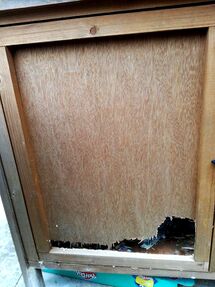
While we do not recommend outdoor housing for the reasons stated above, the following are some resources to help develop an appropriate outdoor rabbit enclosure. Remember the rabbits can easily suffer from heat exhaustion at temperatures over 85°F, and that indoor rabbits have a history of living 4 times longer than outdoor hutch rabbits due to various factors![3]
If keeping your rabbit outside is the only option in your situation, please follow some basic guidelines for housing:
- Make sure your rabbit is always protected from insects through the use of some fine mesh that you can staple to the cage. This is important to protect your rabbit from aggressive insect-borne diseases such as myxomatosis. Keep your outdoor rabbits updated on their vaccinations if they are available in your country, and you may also want to treat them regularly for fleas, mites, and other parasites preventatively.
- Do not keep rabbits outdoors alone all the time; they need company on those dark nights! A bonded pair or group is best outdoors. If you must house a single rabbit outside, please spend a couple of hours each day to interact with your rabbit so they will not be depressed. The more time you can spend with your single rabbit, the better. Rabbits are social creatures and will not do well alone with no interaction.
- Remember, your baby bunny is likely to grow significantly! If your rabbit is young, make sure you consider their adult size when purchasing an enclosure. This housing should be tall enough for your bunny to sit up on their hind legs in the adorable act of periscoping, and it should be long enough for your bunny to completely lie down in with their feet stretched out. Consider having a multi-level enclosure so bunny can survey their surroundings as well as a permanently attached run.
- Just because your rabbit is outdoors, it does not mean they have to be kept in a hutch! Consider large dog kennels with runs, sheds, aviaries, and children's wooden playhouses with runs attached. One small advantage of outdoor housing is that human furniture will not get in the way of the rabbit, and you can often offer larger square footage just for the bunnies.
- While your rabbit make not be able to chew their way out of your new cage, keep in mind what kind of predators might want to force their way in. Be especially careful about access to snakes if they are a problem in your area. Keep your hutch close to the house, and make sure your rabbit has somewhere to hide if they get scared. This hidey hole is also likely to be what will protect your bunny from the elements so it is a good idea to insulate it with some hay, old towels, or other material. Even though your rabbit is kept outside, a litter tray can still be supplied to keep the housing clean, and it provides your bunny with a specific spot to go in so that they will not always lying in their own filth.
- In warm weather, be very careful about flystrike! Check your rabbit's bottom every day to make sure that all poop has been cleaned off properly.
Consider planning for a temporary indoor enclosure occasionally so that the rabbit does not need to be outside on extremely cold winter nights or hot summer afternoons.
The following are some additional tips and instructions on having an outdoor rabbit hutch:
- Save a Fluff. Hutches. runs and alternative rabbit housing
- The Rabbit House. Outdoor Rabbit Housing
- Rabbit Welfare Association & Fund. Outdoor housing
- Rabbits United. (2012). Outdoor Housing
- House Rabbit Society. (2011). Rabbits Outdoors
- petrabbitinfo.com. (2009). Rabbit Hutches - How To Keep Your Pet Rabbit Safe and Happy Outdoors
- Reddit. (2018). Indoor to outdoor
- BOING. Outside Housing
Indoor pens and housing
A variety of options exist for housing rabbits in either a pen or other form of housing indoors.
Size guidelines
Although pet stores market cages and hutches specifically for rabbits, these are usually far too small to comfortably house rabbits and should be avoided entirely unless you plan to leave the cage or hutch open at all times, allowing the rabbit access to a larger exercise pen or free roam area.
From the Educated Rabbit’s article, "Rabbit Cages and Other Terrible Ideas":
The minimum enclosure for 1-2 rabbits (about 5-6 lbs) is a 4x4[ft] exercise pen. This is big enough for a litter box, toys and food dishes. The rabbits are able to stand up, stretch out and hop around. Note: If you have one of the giant breeds, I would suggest you give them free range, a room of their own or, at the very minimum, a 10x6[ft] exercise pen (or bigger). The more room you give a rabbit, the happier they will be.
Important! Despite an exercise pen, rabbits still need to have exercise outside of their pen, as well. They need approximately 4-5 hours of play time a day, so that may be the whole room instead of just a part of it or perhaps a room and a hallway, etc. Whatever you decide the play area should be, you will need to bunny-proof your home to protect both your belongings and the rabbit.
The Ohio House Rabbit Rescue provides the following guidelines:
Our housing requirements are a minimum 4 ft x 4 ft of indoor space in a location where the bunny is part of the family, can receive regular attention, and continue to be socialized. The bunny should also get out of the 4 ft x 4 ft space for regular exercise. We do not permit small cages, outdoor hutches, or wire bottom cages. Many of our adopted bunnies live in free roam homes, or have an entire room for themselves. This is great for the bunnies! However, we do advise “Bunny-proofing” your home or room by protecting exposed wires and cords with products such as Critter Cord or Split Wire Loom Tubing. This will keep your bunny and electronics safe!
The Rabbit Welfare Association and Fund (UK) posted the following:
Check out this AMAZING space display by D&T Veterinary Centre in support of our #AHutchIsNotEnough campaign to demonstrate how much space rabbits actually need.
- A lot of rabbit owners are sadly unaware that rabbits need a lot more space than a commercially sold rabbit hutch has to offer.
- We always recommend a space of at least 2m (6'7") x 3m (9'10") x 1m (3'4") high. This will provide two buns with the sufficient space they need to hop around and rear on their hind legs.
- A hutch can be used as an indoor shelter but never as their sole housing! Ideally, outdoor rabbits should have constant access to safe and secure outdoor space.
Please note that rabbits of larger size (such as giant breeds) will need more than the standard 16 square foot (4'x4') minimum home-base enclosure. Regardless of size or number of rabbits, the more area of living space you can provide, the better.
If you have a young rabbit, be prepared to provide large enough housing as they grow. Small baby rabbits at 8 weeks old can rapidly grow to 10+ lb over the course of a few months if they are actually a giant breed of rabbit.
If you do not have enough floor space to give your rabbits much more than the recommended minimum area, you can also build vertically with multiple story gridded NIC condo pens. However, please keep in mind that the rabbit should still be able to comfortably run in a straight line before you start building taller.
Exercise with the room to run freely is paramount to a rabbit's physical and mental health. Rabbits are recommended to have a minimum of 4 hours of exercise daily. Rabbits will become obese and may develop muscular, cardiovascular, and skeletal issues from a prolonged sedentary lifestyle. Possible medical issues include sore hocks (ulcerative pododermatitis), osteoporosis, urine sludging, and spinal fractures.
Exercise pens
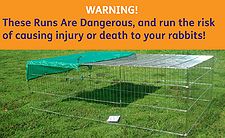
Exercise pens or x-pens, made of metal and usually marketed for puppies and available in pet stores, are the current modern recommendation for basic housing for a rabbit. Plastic play yard for human toddlers may also be appropriate if the rabbits are not plastic chewers. Do not use fabric playpens as rabbits can easily chew through them and escape in a matter of minutes.
Advantages over a traditional cage, hutch, or dog crate include the following:
- Extremely portable (great if you travel with your rabbit)
- Easy to reconfigure and move around the house
- Can also be used outside (always with supervision)
- Lots of room for litter boxes, hidey houses, toys, etc.
- exercise pen walls are easy mounting locations for bottles, hay racks, toys, etc.
- Lots of space for your money
- Unlike cages, hutches, and dog crates, exercise pens that meet appropriate housing standards can easily be found.
Exercise pens are much more portable than a traditional cage, hutch, or dog crate and do not require as much up-front work as an NIC cube condo. The downsides are that you need to provide hiding houses in addition to the exercise pen itself, and this can take away from the portability somewhat. It should be stressed that the combination of an animal carrier and an exercise pen to set up at your new location is probably the easiest way to travel with your rabbit. Because the exercise pen folds, it can easily fit in the trunk or back seat of a small car.
Another handy use of an exercise pen is to keep a free-roaming, fully trained bunny from getting into certain areas. Perhaps your bunny only has unsupervised access to the kitchen or the laundry room. You can use an exercise pen to block off access out of these rooms. You can also use an exercise pen to keep your rabbit away from your bed, the TV stand, or similar cord jungle.
The following are some tips about how to use your exercise pen:
- Set up your pen against a wall to maximize the space you get.
- Use an exercise pen to confine a free-roaming rabbit when you're out of the house, cleaning, or the door is open.
- Attach accessories like water bottles, hayracks, etc. directly to the exercise pen.
- You can use wood or PVC to create a frame for the exercise pen to prevent your rabbit from pushing the edges out. Additionally, if you use a PVC frame and use blankets for flooring, you can also use snap clamps to clamp down fleece blankets and bedsheets to the frame to prevent rabbits from tugging up the flooring.
Exercise pens can be generally be bought for anywhere from $30-$150. You may find them second-hand on classified ads like Craiglist and Kijiji for even cheaper. Note, be sure to sanitize any second-hand or reused pens. Exercise pens generally outcompete cages in terms of square footage per dollar.
If your bunny is not a jumper, 24" tall exercise pens can be sufficient. Otherwise, 36" or higher is recommended for most rabbits unless you know they are lazy and not escape-prone.

A few cover options:
- Midwest 4x4 wire top
- Using a fitted full-size sheet and clip to sides with binder clips.
See the FAQ question "How do I stop my rabbit from jumping out of their enclosure?" for more tips on foiling mischievous escape-prone rabbits.
The wire tops are especially helpful if you have other pets like dogs and cats in the household and need to prevent them from climbing or jumping the fence to reach your rabbit.
Some popular simple wire pens are the following:
Warning: Tiny baby bunnies should not be placed in a regular exercise pen without additional barriers as they can easily squeeze out between the bars. You will either need to cut out 12-18" strips of cardboard and attach them to the bottom half of the pen to cover and make it solid until the babies grow bigger or find an exercise pen with only 1"-spaced bars such as the following:
- Marshall Small Animal Playpen
- Marshall Pet Products Pet Deluxe Play Pen, Small
- Kaytee Pet-N-Playpen for Rabbit, Guinea Pig and Ferret
Heavy duty
The following are some heavy duty pen choices:
- BestPet 8-32 panels 24”-40” height heavy duty playpen
- TAVATA 8-24 panels 24"-40" height heavy duty playpen
- FXW Rollick 2-48 panels 24"-50" height heavy duty playpen
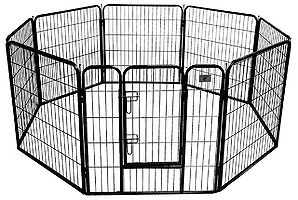
Plastic
The following are some clear plastic panel pen options:
- Lucidium Pens by Clearly Loved Pets
- Tespo Dog Playpen
- SONGMICS Pet Playpen
- MAGINELS Pet Playpen
- C&AHOME Pet Playpen
Warning: Please be aware that some especially stubborn rabbits may chew through the plastic panels.
Some plastic pen options:
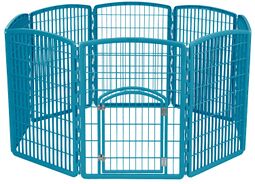
Here are some links with more information on using an x-pen for your rabbit.
- San Diego House Rabbit Society, X-Pen Living Can Improve Your Rabbit's Life
- Zooh Corner, Setting up the X-Pen
- House Rabbit Society, Beyond Cages: The Possibilities of Pen Living
- Buckeye House Rabbit Society, The Advantages of Exercise Pens
- Kathy Smith, Exercise Pens
Wire cube DIY pens

Wire cube DIY pens can potentially be a cheaper alternative to alternative housing choices, but they require some work to assemble, in addition to careful planning. These condos are great for jumpers that will escape open-top pens. You can also build them to suit non-rectangular corners of your home to fit around your furniture. They may also be called C&C (cube & coroplast) cages from the guinea pig terminology or Neat Idea Cubes (NIC) cages, the original brand that started making wire cube storage systems.
The basic theory behind this style of housing is to assemble the wire shelving solutions available in stores into a gridded pen using zip-ties. Aspirational owners can even decide to make multi-story condos using additional wood or shelving. You can easily adjust the size of the gridded pen and condo to suit the shape and size you want. Note that the minimum enclosure size for the base floor should be at least 16 sq. ft before you begin building taller with more floors. This can be met by either leaving a smaller condo permanently open on the bottom to a large penned area or room or planning for appropriate full condo size.
However, something to keep in mind is the additional costs of necessary supports, suitable flooring, and other components that may be required to ensure the enclosure is spacious, practical, and safe. These wire shelving solutions were not designed originally to be repurposed as gridded pet pens, even though marketing has taken that approach. Using only the connectors provided, building without considering the weight of your rabbit, and/or creating large/wide upper levels without considering lack of bottom supports can all lead to an unsafe enclosure.
Some stores you can buy wire grid panels from are the following:
- United States
- Amazon.com - 6-box set (23 panels), set of 48 panels, Tespo pack
- Staples (23 panels)
- Target
- Home Depot (23 panels) - Be careful, 6 of the panels are of a larger size.
- Bed Bath & Beyond
- Store Supply Warehouse (individual)
- Seville Classics (9 panels)
- Pre-made NIC DIY kits available on Ebay by bunnycondos
- Canada
- Amazon.ca (16 panels)
- Walmart (13 panels) - Be careful, 8 of the panels are of a larger size.
- Bed Bath & Beyond (18 panels)
Warning: You will need to make sure the type of wire shelving you purchase should have the grates relatively small so your rabbit cannot get his head through. Otherwise, your rabbit may get injured or strangled. There is one type sold at Target and other stores that has bigger grates than the rest. These should either be discarded or used as unreachable walls, shelves, or pen tops. If they have to be used, cover them with cardboard or double grate them to make the holes smaller.
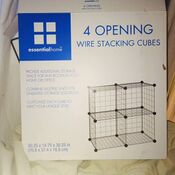
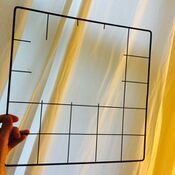
Also, when using zip ties, make sure to have the tie wrap ends face the outside of the gridded pen so that if you accidentally forget to clip one, it does not cause eye injury to your rabbit.
Examples of rabbits escaping wire cube pens:
Signs of Poor Construction:
- 1. Inconsistent gap sizes across connected grids - The most sturdy foundation (which you then reinforce with zip ties and other supports) comes from grids that are all manufactured perfectly square and are properly fit into each connector. This will result in parallel gaps all around your build. Any warping or improper connector fitting works against your build's stability and overall safety.
- 2. Bulging connectors - If your connectors appear to "bulge" where grid corners are inserted, this is a sign of poorly fit parts, low-quality connectors, and/or too much stress (i.e., weight) in a given area. Connectors are plastic, so any defects or signs of cracking should be immediately replaced and additional supports added as necessary. If well-built and constructed, no connectors should bulge or crack.
- 3. Bowing/Sagging grids - Under no circumstance should any grids begin to show warping, bowing, or sagging. If well-built and constructed, all grids should retain their perfectly flat and square shape. Failure to maintain shape means there is inadequate support for the weight the grids are holding.
- 4. Noisy - If you touching or your rabbit moving in the build consistently causes rattling, squeaking, or similar noises, this can be a sign of loose parts and/or bad connectors. If well-built and constructed, your build should be silent with exception of any binder clips or other supports you have used to reinforce the structure that are not tightly fastened.
- 5. Need to re-attach connectors - Once fit into a connector, no grid should be able to slip out. If sections of your build require regular "popping back in" of particular grids to connectors, directly address the problem through replacing parts and/or using zip ties-- this should not be happening in a well-built and constructed wire cube enclosure.
Some examples and instructions to set up wire cube condos can be found at the following pages.
- Long Island Rabbit Rescue Group. NIC Cube Rabbit Cage Construction
- Build a Rabbit Condo. More Rabbit Condo Details
- 3 Bunnies Rabbit Rescue. Oliver's New Home
- Cavy Cages
- House Rabbit Network. Building a Neat Ideas Cube Condo
- Princess Blackie's Web Page
- Cages that are easy to build and inexpensive!
- Brey family. How To Build an Indoor Bunny Cage
- Wisconsin House Rabbit Society. A Project Idea: Bunny Condo from Neat Idea Cubes
- Bunny Blurbs, by /u/nafalie. Bun Estates
- BOING. Build an indoor house
- BudgetBunny. Building Your Own Bunny Condo – A Step By Step How To
- The Rabbit House. Making a Cube Rabbit Cage
- sunflowerb. Alonso's New Home: My DIY bunny cage
For a useful tool to help plan out your gridded pen, please see the following post by u/WickAndFable - Housing: Online Tools for Grid-Cage Planning
The following are some videos about setting up a NIC condo.
Here are some relevant discussions about NIC condos.
- RabbitsOnline. (2021). Need Help Deciding On Which NIC Cube Set To Get - Zip Ties Etc.
- BinkyBunny.com. (2012). Do you have a Bunny Condo???
Dog crates
Dog crates can be used for rabbit housing, but they (yes, even the extra large ones) are only appropriate as temporary housing in emergency intake situations such as in shelter or rescue settings, in instances of medically necessary cage rest for broken bones, or left open all the time.
They can be an excellent option for a "safe space" that a rabbit can willingly retreat to, but it is important that the door remains open at all times, allowing the rabbit access to a larger exercise pen or free roam area. The large doors make them easy to clean, and the plastic pans on the floor help to protect your flooring underneath.
While dog crates may collapse easily for travel, they can weigh much more than tall x-pens and be difficult to easily move.
Warning: Traction material such as blankets and towels is recommended on the bottom floor, especially if there are two levels in the dog crate. Rabbits can fatally injure themselves by slipping when jumping down. Additionally, slippery flooring often leads to joint issues or even splayed legs.
- u/grow_something. (2015). Comment on post "Modifying dog cage?"
If you must temporarily make do with confining your rabbit to only a dog crate outside of specific veterinary-guided medical reasons, your rabbit should receive as many hours as possible of exercise time every day to stretch out their legs. If circumstances only allow for a small cage or hutch as housing with no hope of improvement, rehoming your rabbit is heavily encouraged for your rabbit's welfare.
Some models available on Amazon:
Here are some guides on using and converting one to a rabbit abode.
- Bunny Lovers Unite, JoJo's Guide to converting a dog crate / cage into a rabbit cage
- The Rabbit House, Dog Crates as Rabbit Cages
- The Rabbit House, Rabbit Cage Shelf Instructions
Below are some relevant discussions.
Commercial cages and hutches
Most commercial cages and hutches advertised towards rabbits are far too small for any size of rabbit and rarely let a rabbit stretch out or sit up. Cages and hutches are only appropriate for temporary housing in emergency intake situations such as in shelter or rescue settings, in instances of medically necessary cage rest for broken bones, or left open all the time.
If you use a commercial cage or hutch as a home base as a litter box and the rabbit is free-roaming, size is not so much of an issue. It can become a large problem when the rabbit is shut in for hours on end. If your rabbit cannot be free-roam, they must be used in combination with one or more permanently attached exercise pen(s).
If you must temporarily make do with confining your rabbit to only a cage or hutch outside of specific veterinary-guided medical reasons, your rabbit should receive as many hours as possible of exercise time every day to stretch out their legs. If circumstances only allow for a small cage or hutch as housing with no hope of improvement, rehoming your rabbit is heavily encouraged for your rabbit's welfare.
Be especially careful of cages and hutches with a wire floor. Rex and heavy breeds are especially prone to sore hocks in wire-bottomed cages/hutches due to the uneven pressures of the wires. Additionally, untrimmed nails and toes can get caught in inappropriately-sized holes and be broken. If you must use a cage or hutch with wire flooring, we recommend covering the entire bottom with more solid flooring such as resting mats, cardboard, or blankets and towels instead. If a rabbit is litter-trained, there is no reason to need a wire-bottomed cage or hutch.
The following links are some graphic images of rabbits that were found inappropriately kept on wire flooring:
- Bunny Binkies Club. (2020). Jalen's story
- Bunny Puffs Exotic Refuge. (2020). Chocolate's story
- Indiana House Rabbit Society. (2019). Gianna's story
If you buy a cage or hutch with a solid slick plastic flooring, cover the bottom with another surface like a towel or grass mats or use the entire surface as a litter box. Jumping around on the slippery surface can predispose rabbits to hip problems.[4]
Please be wary of cages/hutches with multiple stories. Make sure that the floors are not too far apart (<18"), and the rabbits have secure footing and enough space to comfortably hop up and down to prevent injuries if you choose to use one.
Look for cages and hutches with a side door to allow the bunny to hop in and out on their own and possibly an additional top-loading door for ease of cleaning.
If the cage/hutch door opens on the side as a ramp and is made wire, cover the wire door with something solid like cardboard or a blanket or towel so that the rabbit's feet cannot accidentally be caught between the bars when entering or exiting. The top of the wire cage/hutch should be covered similarly. Injuries that can result from caught toes and limbs can range from broken nails, sprains, fractures, dislocations, and completely broken bones.
- Hayley Simon. (2024). Baby rabbit got foot stuck in wire, was found hanging upside down, and fatally injured herself. (RIP)
- u/GoddessOfMyKitchen. (2022). 3-month-old rabbit climbed on top of cage and broke one of her back legs.
- Reddit. (2021). Comment thread of users that knew of or had rabbits that had limbs caught in wire cages with deadly results.
- u/tomb1125. (2018). Rabbit jumped off cage and his hind leg was stuck between bars.
- New Jersey House Rabbit Society. (2018). Rabbit back leg slipped between bars of wire cage door.
- Nutmeg. (2018). Rabbit got foot caught on top of cage when trying to hop off.
Never use glass aquariums because they are rarely large enough and do not have enough air circulation. Rabbits overheat very easily.
Commercial cages and hutches available online for purchase
Some extra-large cages available on Amazon that may be appropriate for using as a home base in a larger living space:
- Ferplast Krolik 160 Rabbit Cage, 64"L x 24"W x 20"H
- Ferplast Krolik 140 Plus Rabbit Cage, 56"L x 24"W x 20"H
- Super Pet My First Home Giant Rabbit Habitat, 47"L x 24"W x 24"H
- Pawhut 47" Portable Wire Bunny Rabbit / Ferret / Guinea Pig Hutch House, 47.2"L x 22.8"W x 19.7"H
- Living World Deluxe Pet Habitat, X-Large, 46-8/9"L x 22-4/5"W x 24"H
- My First Home 2-Piece Giant Rabbit Habitat with Casters, 48"L x 24"W x 16.5"H
- Prevue Hendryx 525GRN Small Animal Tubby, Extra Large, 47-1/4"L x 24-1/4"W x 21-1/2"H
- Prevue Pet Products Small Animal Cage with Stand 620 Powder Blue and White, 47"L x 22"W x 37"H
Some businesses that craft larger cages with solid flooring options:
- Leith Petwerks, Inc. Housing
- KW Cages. Bunny Villa
- My Pet Cages by Ultra Lite. Kitty Condos
The following are some guides on choosing a commercial cage or hutch to use indoors. Remember that the cage or hutch should only be used as emergency temporary housing or for medically-necessary cage-rest; otherwise, it should be left open at all times. Cages and hutches that are elevated should exclusively be used in instances where the door stays closed (such as with cage-rest). Otherwise, the rabbit could easily fall and get hurt upon exiting.
- The Rabbit House. Rabbit Cage Reviews
- The Rabbit House. Choosing an Indoor Rabbit Cage
- The Rabbit House. Two Storey Rabbit Cages
- The Rabbit House. Plastic Rabbit Hutches
Other custom enclosures
You can also come up with your own DIY custom enclosures using wood, metal, re-purposed furniture, and other materials. Keep in mind the proper dimensions you will need for a comfortable-sized enclosure for your rabbit. Remember to make any slats fairly close together so that the rabbit will not get their head stuck and be accidentally injured or strangled.
Using chicken wire is not recommended as rabbits can chew through it very easily and dogs and raccoons can as well. Use hardware cloth or at the minimum 19-gauge wire mesh.


The following are some examples of custom-made rabbit housing enclosures.
- Grace Bonney, DIY Project: Nicole's Modern Bunny Hutch
- IKEAhackers.net
- Jason Griffith, Two Story Rabbit Hutch
Enclosure setup
Regardless of the enclosure you choose, there should always be some basic items in your rabbit's housing enclosure.
- Litter box
- Hay rack or holder if you don't place hay in the litter box. See Hay for DIY options.
- Water bowl or water bottle at least one for every rabbit. For those that would prefer to fill up water less or have heavy drinker, try water dispensers. See Diet for more information on pros and cons of both options.
- Heavy duty ceramic bowls for food (if used), at least one for every rabbit - if you use plastic, be careful that the bunny may flip it over or chew on it. Food bowls are technically unnecessarily - you may scatter feed pellets on the floor or use foraging mats or puzzle balls to increase foraging and decrease choking risks. Vegetables can be tossed on the floor or in the litter box for feeding.
- Toys - chewing material, digging material, throwable objects, etc.
- Soft flooring - be sure that your rabbit does not ingest this. See notes below for more recommendations.
- Hidey house - empty cardboard box, bunny-safe wooden castles, overturned baskets with 2+ entry holes cut out, towel draped over one corner. See Toys for more toy ideas.
What kind of flooring is good for rabbits?
Popular soft flooring materials include the following:
- low-pile rugs - Popular affordable options in the US include 6 ft. x 8 ft. Indoor/Outdoor Area Rug (Home Depot), 6x9 indoor/outdoor rug (Costco in-store). Look for tight-woven machine made rugs without loose fibers to make it more difficult for rabbits to grab with their teeth and claws to dig up. Keeping the rug edges out of reach also helps prevent destruction.
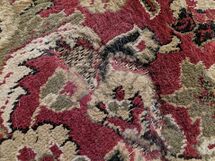 The limit of rabbit destruction with months of work on a machine-made low-pile olefin rug.
The limit of rabbit destruction with months of work on a machine-made low-pile olefin rug. - rabbit-safe edible rugs made of jute, sisal, or seagrass
- fleece blankets - You can buy it by the yard from fabric stores such as Jo-Ann
- bed sheets
- comforters
- DIY rugs made with cardboard, velcro, and towels
To protect hardwood floors or existing carpet, be sure to add a waterproof barrier underneath the soft flooring you decide to use. Examples include the following:
- vinyl sheet, PVC, or linoleum rolls (e.g. clear marine vinyl, plastic table protector)
- shower curtain
- plastic chair mat
- foam playpen pieces
- foam equipment mats (Warning: bunnies may gnaw off the treadmill pattern)
- whelping pads, washable pee pads, and pet blankets
- bed pads
- plastic sheets
General bedding in an enclosure is not needed. It will confuse the rabbit when trying to litter train the rabbit. The only bedding and litter needed is in the litter box.
Extra resources:
Housing galleries
Below are some galleries of example rabbit housing setups.
- The Rabbit House, Rabbit Housing Gallery
- Plüschnasen, Gehegebilder
- The Bunny Groomer, Environments
- Pinterest, Rabbit Housing Ideas
- Pinterest, rabbit housing
- Instagram, #bunnycondo
- Instagram, #bunnycage
- Instagram, #rabbitcage
Free range rabbits
Untrained rabbits should be kept in an enclosure during the night and while you are away from home. When you see consistent litter habits when your rabbit is let out to play, you might think about letting them roam free range permanently with a home base. Some rabbits can also naturally be free-roam on rugs with the use of slick hardwood or tile as an invisible fence.
Note that an adult bunny will probably be easier to train and less destructive than a juvenile or baby.[5]
Several prerequisites are needed, however.
- Block off locations you do not wish the bunny to be in with baby gates, fences, or doors. Be sure that they cannot jump over them. Dutch doors are great option if you'd like the flexibility of a regular solid door with a baby gate.
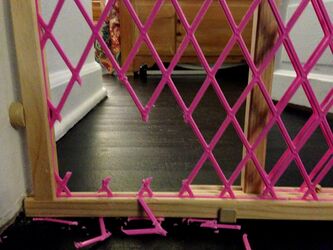
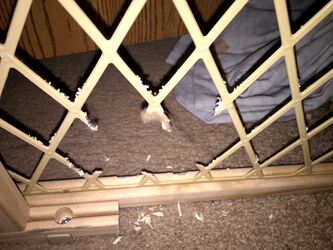
Some models available on Amazon:
- Fully bunny-proof the place where the rabbit will be roaming. Make sure there is nothing that he can get under or over that could possibly harm them. Hide all belongings that you don't want possibly destroyed, and make sure all dangerous items are also out of reach.
- The bunny should still have a home base such as a large cage or pen with a den available to them. This allows them to have a place to retreat to for peace and quiet. Things that should be provided in this base or nearby include a litter box, hay, and water.
- Make sure the place has proper flooring allowing the rabbit to hop, stand, and run without slipping -- a concern especially important for older rabbits. Provide a soft surface for sleeping.
- Provide plenty of environmental enrichment activities such as cardboard box forts, toys, telephone books, and digging boxes. See Toys for more options. If you have two or more rabbits bonded, they can provide entertainment for each other.
The following are links with more information about free range house rabbits and how to train them.
- Wildpro. Accommodation of House Rabbits (Mammal Husbandry and Management)
- The Rabbit House. (2014). Free Range House Rabbit
- Bunny Approved. (2013). Life with a Free Range Rabbit
- House Rabbit Society. (2016). Litter Training. See the sections Can the rabbit have a running space? and So what’s the actual method?.
Further reading
- RSPCA, Rabbit Housing
- House Rabbit Society, Multi-Maintenance
- House Rabbit Society, FAQ: Housing
- House Rabbit Society, A Sense of Place and Space
- House Rabbit Society, Housing Update
- Rabbit Advocates, Articles
- House Rabbit Network, Suzanne Rubins and Suzanne Trayhan, Rabbit Real Estate: Housing Options for Your Pet Rabbit
- San Diego House Rabbit Society, To Cage or Not to Cage
- Kathy Smith, Cages and Condos
- The Rabbit Residence Rescue, Choosing rabbit housing
- bunnymama.com, Cage or Pen Area?
- Bunny Approved, Indoor Rabbit Housing
- Rabbit Welfare Association & Fund, Home Sweet Home: How to house your rabbit. Updated Feb 2002.
Here are some relevant videos you may watch.
References
- ↑ San Diego House Rabbit Society, Why to Keep Your Rabbit Indoors
- ↑ Bunniez, The Great Indoor Rabbit Debate
- ↑ Dana Krempels. (n.d.). Why an Indoor Bunny?. Retrieved 10 Jul 2019 from http://www.bio.miami.edu/hare/indoorbun.html
- ↑ Wisconsin House Rabbit Society, WHRS Rabbit Care Guidelines
- ↑ JSPCA. (n.d.). JSPCA House Rabbits Training Fact Sheet. Retrieved 14 Mar 2017 from https://media.wix.com/ugd/bae167_5429538f939f42c0983cf700ee6698f8.pdf


